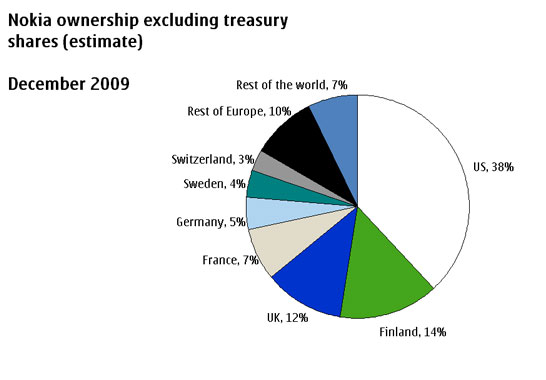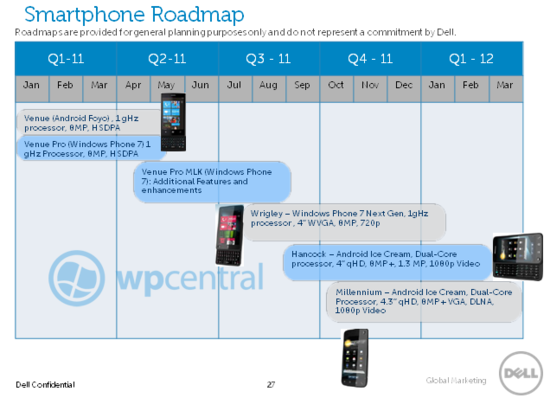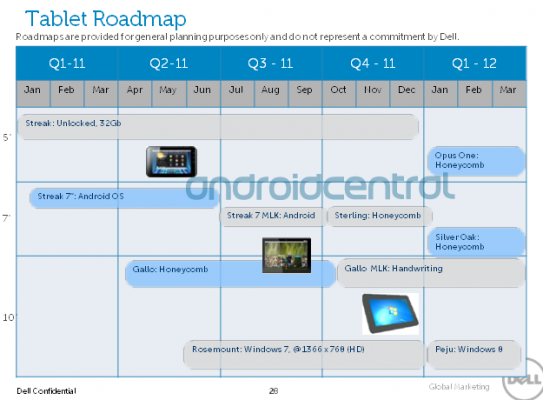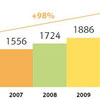Spillikins #107. Subsidized phones in Russia Ц The First Step Forward
The last week was wholly devoted to the mobile congress in Barcelona and there was simply no time to stop and mull over the multitude of the current events. An attempt to do so within the Spillikins is doomed to fail. There is, for example, a price war going on now on the market of retail networks which I wanted, at first, to cover in the Spillikins but later I realized that this topic deserves a separate article.
I failed to finish off the Barcelona material and prepare the concluding article on the week end. It will be released on Tuesday, meanwhile, I recommend you to have a look at the about twenty articles written at sight at the expo: they have a lot to offer you.
You can understand the intensity of emotions by the fact that last week end a new CEO was elected for Vimpelcom Russia, and I am very curious where Elena Shmatova will go and on what conditions. This is not idle talk, depending on who will lead the team from now on we will be able to predict how fast the company will get back on the right track. And there is still the news about MTS and Beeline subsidizing phones that we will look into right now in the Spillikins. Plenty to be entertainedЕ
Contents:
- Subsidized phones from Russian carriers Ц State of the Market. MTS vs Beeline
- Nokia plan B, or the Microsoft's purchase
- App stores rates 2010
- DELL tablets and phones
Subsidized phones from Russian carriers Ц State of the Market. MTS vs Beeline
There are leaks all the time and on this week it happened to DELL Ц slides with the company's plans for 2011 leaked to the web. We can see that the company, being a devoted friend of Microsoft, is planning to launch Windows tablets, but I would not expect booming sales. On the other hand, even DELL gives a lot of attention to Android and offers a series of robots. I do not think that DELL will be making a difference on the phone and tablet markets so I am not going to describe the new products Ц the slides speak better.

That is why phones the Russian market has been until recently not bound to any carrier. However, in summer 2010 Beeline started experimenting with subsidized phones to enter the new market. They chose an inexpensive ZTE phone, known as Beeline A100 in Russia, to be the guinea pig. For about 30$ (850 rub) it offered also 300 minutes of voice calls during three months (3 minutes and 3 SMS per day) as a bonus for the phone. Of course, if you count the cost of these services the phone's price gets significantly lower. But most important of all, Beeline also offered special terms of sales of this phone, in particular, it offered remunerations for retailers for every buyer within three months. This caused an avalanche of A100 sales Ц the model became twice more attractive.
More on the A100 sales.
According to Beeline in the second half of 2010 A100 made up for 5 per cent of the Russian cell phone market (in terms of the number of handsets), and 3 per cent as for the sales of the whole 2010. Unfortunately, the company does not provide an assessment of the general market volume. But it is not that important, we know that the company sold almost teo million phones, with the minimum of 150 thousand phones a week.
In early 2011 a curious thing happened to this phone: in some regions A100 received the price tag of 3$ (99 rub). This price looks like a marketing gimmick. The number of bundled minutes and SMS did not alter, but their value is now calculated according to the bundled tariff plan. They made it into popular mathematics that appealed to the subscribers Ц it is now clearer what you are paying for and that the phone is practically gratuitous Ц a real bargain. Without any advertisement, in the cities where the price tag was at 3$ the sales soared manyfold. MTS did not want to miss the party and prepared a symmetrical response. But Beeline was unwilling to lose the initiative and adjusted the A100 price for all the country.
Starting from late February the price goes down from 30$/850 rub (it was lower in some regions, but it is not relevant) to 23$/699 rub. And the stores put up the price tag of 3$/99 rub Ц this is it Ц the psychological value. For which you get the same 300 minutes and 300 SMS with the time limit of three months. Only now they are not split into separate days Ц you may use them as you wish within this period of time. And the company also added 2$/50 rub on your account for any unforeseen expenses for services. The remainder is 3$/99 rub, which the actual price of the phone.
Is this a case of subsidizing? Undoubtedly yes, the bulk price for the phone is much higher than 3$/99 rub. Is this scheme profitable for the carrier? I think it depends on how people will use this offer. If the number of those who decided to keep the SIM and continue using it exceeds at least the half of the buyer Ц Beeline will be in the black. But if the number of refuseniks is high the losses will be significant.
Will this offer be popular? It will be very popular in the province and the fact that the competitors still cannot offer anything equal is very meaningful. Beeline is sacrificing the profits to break the market rules. Along with the Svyaznoy that gives you a budget phone for free for a purchase exceeding 100$/3000 rub it creates a dangerous precedent. It is getting hard to sell inexpensive phones Ц it rebounds at the sales of major manufacturers like Samsung and Nokia. It is worth mentioning that in 2011 Beeline will sell several millions of A100 Ц very significant rates for the Russian market.
So, what was the MTS response? It was not quite symmetrical: MTS wants to make more money than Beeline out of their phones. That is why they chose BASIC 140 phone as the base with 90 minutes of voice calls and 20 minutes of voice calls to MTS network within the CIS (his offer is unique, though it is still not good as Beeline's). I want to make a note here that neither of the carriers' offers has been officially announced so the offers are still subject to minor alterations. The price of the MTS phone is 21$/650 rub. Expiration limit for the minutes Ц same 3 months. It is easy to calculate that the MTS offer is less attractive for subscribers Ц the phone is simply more expensive. But on the other hand, it is exactly the same course of actions Beeline took. And it is a further blow to budget phones of other manufacturers. For that matter we may say that the plans of the carriers to occupy 25 per cent of the cell phone market in Russia in 2011 seem very much realizable.

Back to the table of contents >>>
Nokia plan B, or the Microsoft's purchase
I was glad to take Nokia out of my head for a whole week during MWC 2011. It allowed me to sort a lot of things out and understand what is going to happen next. There have not been a lot happening to Nokia since I wrote the article about the company's future and they rather complement my article that pose a different point of view.
A new webpage called NokiaPlanB.com suddenly appeared and immediately became very popular. There a number of Nokia investors proposed a new course of actions besides Microsoft as the main Nokia's partner for smartphone production. It had rather logical suggestions that were widely discussed and embarrassed Nokia. However, Plan B turned out to be just a hoax that, in my opinion, succeeded to interpret the sentiment of the audience. Currently their URL redirects you to a Twitter account saying that it was just a hoax. Well, I think, it succeeded completely.
Cunning reporters quickly found out that Nokia new CEO Stephen Elop did not give up his 130000 Microsoft shares and immediately called him a Trojan horse sent to Nokia to annihilate the company. There was no official response but during a meeting with the press in Finland Elop stated that he had sold the Microsoft shares and bought a stake in Nokia. Unfortunately, there is no respective entry in the Securities Commission so far. We will have to take his word for that.
Officially confirmed possession of Microsoft shares by Elop.
All the last week Elop spent explaining the Nokia stance; in particular, he claimed that the company will not receive any bonuses from Microsoft for the agreement and that such allegations are merely speculations. However, the Finn trade unions' stance is very tangible Ц they demanded layoff benefits to be at least 100000И for every dismissed Nokia worker. According to the trade unions Nokia is going to lay off about 5000 people next year. Very unfortunate.
And there is yet another issue interesting in regard with the Nokia situation. The company rapidly loses the its market value, after the agreement was announced its stock plummeted and will be highly volatile in the future Ц and there is no reason yet for the shares to go up. Let us have a look at who constituted the majority of Nokia investors in 2009 (no newer data are available).

We can see that de facto it is an American company and it is the American investors who set the course of actions. At the Barcelona congress I had an opportunity to thoroughly discuss the situation with a man who told me about the negotiations between Nokia and Microsoft back in November 2010. He considers the current events natural to the situation we observe. He thinks that to make Nokia use their OS is one of the Microsoft goals but not the main one. The main goal is to depreciate the company, lay off "unnecessary" staff and divide Nokia into two separate companies as it happened to Motorola and then to buy the phone branch of Nokia. The strategic goal of Microsoft is not to just corner the software market but also to create a launch pad for the future in form of mobile devices operating under its OS. Currently MS positions on the mobile market are very weak and it is unlikely that anything changes in the short term prospects. While Android keeps gaining pace the inability of Microsoft to create a compatible OS is a threat to the company's future. The biggest sales in the coming years will be on the mobile market and not anywhere else. Though this is still only a rumor. But if Nokia shares keep depreciating and the management takes strange decisions targeted only to further depreciate the company's assets then, I believe, we will all know who will benefit from this.
Additional reading
You may look at what has happened to the previous Microsoft partners with Windows Mobile. Ц a very detailed enumeration of companies and their fate. Unfortunately, you won't find any happy ends (in English).
Back to the table of contents >>>
App stores rates 2010
A very interesting data came out with data on the app stores size in 2009-2010. According to the statistic data Apple remains the leader, though OVI Store demonstrates very impressive growth rates. See for yourself

I think it would be even more interesting if we had these data per number of devices Ц it would be more illustrative. Apple e.g. would be even farther ahead from the competitors but for the companies below the picture would be quite different. Would you be so kind as to calculate it?
Back to the table of contents >>>
DELL tablets and phones
There are leaks all the time and on this week it happened to DELL Ц slides with the company's plans for 2011 leaked to the web. We can see that the company, being a devoted friend of Microsoft, is planning to launch Windows tablets, but I would not expect booming sales. On the other hand, even DELL gives a lot of attention to Android and offers a series of robots. I do not think that DELL will be making a difference on the phone and tablet markets so I am not going to describe the new products Ц the slides speak better.


These Spillikins are shorter than usual because after warm Barcelona the Moscow frost knocked me down and it is hard for me to work in front of the computer. I wish you a nice and productive week, more good news and I invite you to discuss the mobile world on our forum. Best regards.
Do you want to talk about this? Please, go to our Forum and let your opinion to be known to the author and everybody else.
Back to the table of contents >>>
Related links
Eldar Murtazin (eldar@mobile-review.com)
 Twitter Twitter  Livejournal Livejournal
Translated by Robert Mugattarov (mugattarov@gmail.com)
Published — 21 February 2011
Have something to add?! Write us... eldar@mobile-review.com
|










